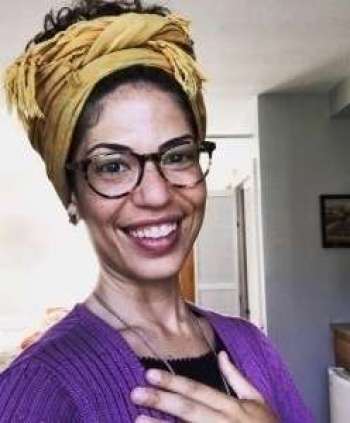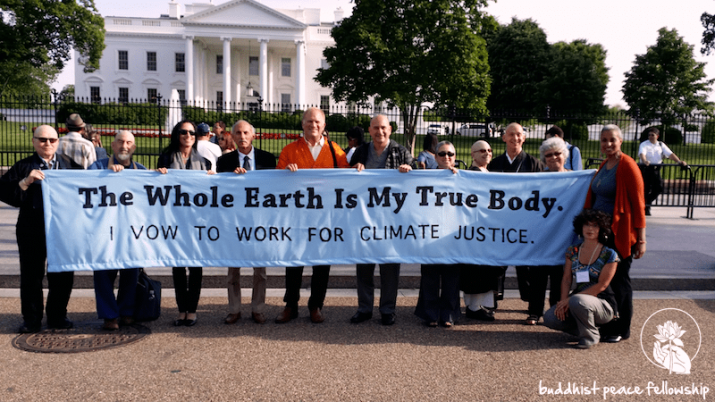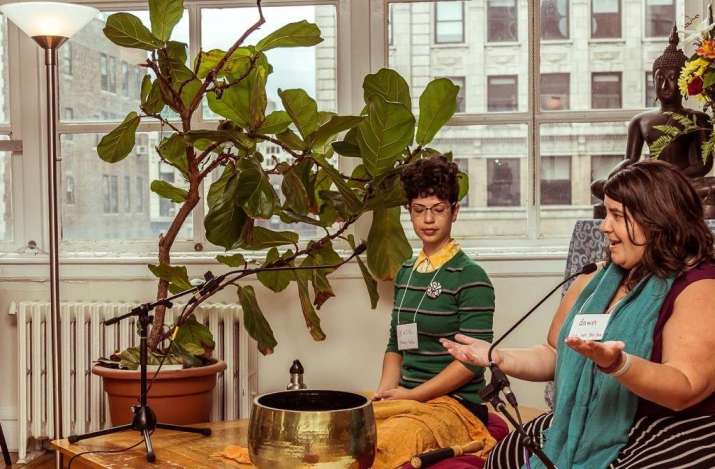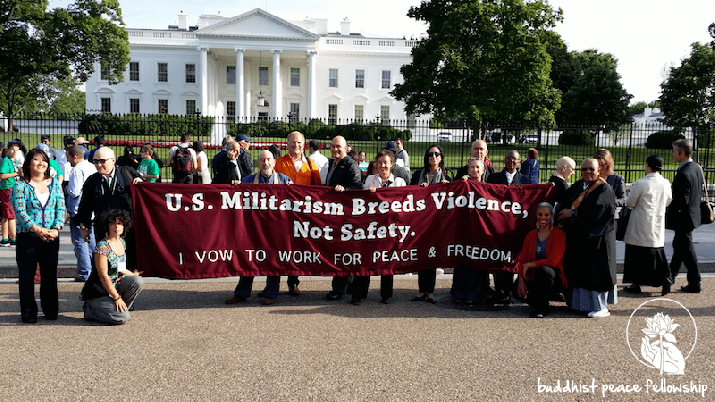In 1968, Buddhist poet Gary Snyder wrote: “The mercy of the West has been social revolution; the mercy of the East has been individual insight into the basic self/void. We need both.” Ten years later, in 1978, the Buddhist Peace Fellowship (BPF) was founded and has carved out a niche as the preeminent North American Buddhist organization in matters of peace, social justice, environmentalism, and political activism.
The Buddhist Peace Fellowship is a nonsectarian network of engaged Buddhists based in Oakland, California, with members around the world. Among its historical leaders are luminaries of North American Buddhism, including Robert and Anne Aitken, Gary Snyder, Joanna Macy, and Jack Kornfield. The organization has made news over the years by hosting Thich Nhat Hanh’s first retreat for Western Buddhists in 1983, protesting the US war in Iraq, demonstrating in support of Burmese Buddhists during the Saffron Revolution of 2007, and publishing the award-winning Turning Wheel magazine.
Today, the BPF continues its mission through ongoing activism as well as adding retreats and online classes and workshops. This month I interviewed Katie Loncke, who co-directs the organization alongside Dawn Haney.
Buddhistdoor Global: Can you tell us about the BPF’s historical mission and recent activities?
 Katie Loncke. Image courtesy of the author
Katie Loncke. Image courtesy of the authorKatie Loncke: The Buddhist Peace Fellowship is a home for people seeking to bridge Buddhism with social and ecological justice. We’re a diverse bunch: lay and ordained, militant and pacifist, all drawn to the same watering hole of inquiries. How to get free? How to love this world as it is, and fight to change it? That could keep us busy for a few lifetimes. [Laughs]
These days you can catch BPF’s flavor in three main places:
1. Our annual Block Build Be gatherings, where we practice toward spiritual-political liberation.
2. Our online culture, where we value genuine connection and truth telling.
3. And our spiritual activist support, where we’re the type of Buddhists you can call if you need a nonviolent blockade.
BDG: And what brought you to the BPF?
KL: I think the most concise way I can describe my pull to the BPF is with a poem I love by Jane Hirshfield, called “Tree:”
It is foolish
to let a young redwood
grow next to a house.
Even in this
one lifetime,
you will have to choose.
That great calm being,
this clutter of soup pots and books—
Already the first branch-tips brush at the window.
Softly, calmly, immensity taps at your life.
It's really that feeling of awe and paradox for me, you know? The beloved clutter: in my life that’s organizing. Resistance. Justice. Books. Theories. Strategically reaching the structural causes of oppression to remove a few barbs of cruelty from the world. My family is Black on one side, and European-Jewish on the other, and my ancestors survived atrocities. Because of the ideals they handed down to me, I have a taste for fighting back; fighting for what I believe is right.
Meanwhile, the Buddhadharma, and my great fortune to encounter it in this lifetime, feels like the growing redwood. Mysterious. Unstrategic. Calm. Beyond words. Beyond my intellectual comprehension. Perhaps even, in the words of Rumi, beyond right and wrong.
Quite honestly, I don’t know how these sides of my journey will continue to fit together. It’s a massively alive question for me. And that’s what pulls me to spaces like the BPF. It’s precisely because I don’t know the answers that I so appreciate finding others who share the same awe and excitement, tension and tragedy, between our spiritual and political approaches to life. It means we’re earnest, honest, and not faking it.
BDG: Some people say that Buddhists shouldn’t be involved with political topics. Others are involved with politics but say that side of life shouldn’t be mixed with Buddhist practice. Where do you fall here? Do Buddhism and politics intersect at specific points for you? Is there clear and deep overlap?
KL: From the BPF’s perspective, Buddhism and politics overlap when both care sincerely about alleviating suffering. That’s the simple way of putting it. And like relative and ultimate truth, I think it’s not a competition; we need both. Spirituality can take us places that politics can’t, and political work—when well designed—grounds us in material action toward ending exploitation, harm, and violence.
That said, of course, there are unskillful ways of combining politics and Buddhism, and it’s understandable that people might be wary. It’s obvious that Buddhist nationalism, or persecuting those who are not Buddhist, is not what we’re about. Just like Christian fundamentalism and militarism, Buddhist fundamentalism and militarism—from Japan to Myanmar—brings great harm and suffering. And even with our best intentions as activists, or as people trying to do right by the world, we can succumb to what Chögyam Trungpa Rinpoche called “spiritual materialism,” and use spiritual practice to cling to certain ideas about ourselves, rather than opening our hearts and staying genuinely curious.
But as long as we practice the Dharma in human bodies, how can we escape the political realm? Do you eat food? Do you breathe air? Do you have a passport, or not have a passport? Do you interact with other humans who judge, accept, menace, or protect you? All of these arise in a field of contested power. It’s not a choice of being political or not; you can’t be neutral on a moving train. And it’s okay—politics isn’t a dirty realm! It can be marvelous and deeply inspiring.
Harriet Tubman was political. Standing Rock was political. Pride and Stonewall are political. #MeToo is political. Planting trees is political. Caring for each other, and asking for help when we need it, is political.
Why shrink from the beauty and joy of working hard to alleviate suffering?
BDG: With so many pressing issues today, how do you choose the ones you’ll work on?
KL: Great question. It’s tough. Audre Lorde famously said, “There’s no such thing as a single-issue struggle because we don’t live single-issue lives.”
I often say in activism we are susceptible to a hungry ghost mentality. No matter how much we do, we can never do enough. Rallies, court support, advocacy, childcare, calling elected officials, painting banners, and printing flyers, let alone surviving with our own traumas. It’s a lot! But by building spiritual power, I believe we can find our purpose more easily, more clearly, with less fuss.
Once we’ve found some focus and set some boundaries, the question then becomes: how can we tap into mudita, sympathetic joy, to celebrate all the brave, brilliant, heart-soaring work that other people are doing right now in the world? How can we let ourselves be buoyed and wonder-struck by all the wholesome action that is happening? That attitude helps me dance between appreciation and action.
And do we ever win in the struggles we decide to join? Yes, we do. I don’t want to over-emphasize success versus failure—many of the biggest, most important struggles I don’t believe we’ll decisively win in our lifetime. And anyway, as Grace Lee Boggs said, each victory brings new contradictions. But I will say: the BPF has a pretty good track record. There might be something to this “letting go of attachment to results” thing.
This year, we helped release an undocumented father from detention, reuniting him with his family. That campaign was led by a number of great groups, including the awesome California Immigrant Youth Justice Alliance. We helped shut down an international police militarization program as part of the Stop Urban Shield coalition. We supported Native leaders protecting the West Berkeley Shellmound, an Ohlone sacred site, from desecration.
The point is not to claim credit for any of the wins, but to emphasize that we’re not tepid, and we don’t just do this stuff to pat ourselves on the back and feel better. We want to succeed, but we don’t pin our inner freedom on the success or failure of any given campaign.
BDG: Lastly, what activities or projects are underway and on the horizon that you're most excited about?
KL: The video recording of our event on spiritual and political Sanctuary with Eddy Zheng and Rev. Zenju Earthlyn Manuel is dropping soon, and I'm so pumped! I keep re-watching it and hearing new gems.
Eddy Zheng is an incredible person and presence. Talk about spiritual power! He was incarcerated for over 20 years, and in the recorded conversation he describes how spiritual practice, and Buddhist practice in particular, helped him survive being punished with solitary confinement, in retaliation for organizing he was doing for prisoners' rights. He's constantly reminding us to breathe, and he embodies his ideals so palpably in the work he does with the Asian Prisoner Support Committee.
Rev. Zenju is equally extraordinary, and I'm so happy we are offering to send free copies of her brand new book on sanctuary to the first 50 people who offer a donation for the online video.* So folks should definitely keep an eye out for when the recording drops at the Buddhist Peace Fellowship!
Lastly, over the weekend of 23–24 June, the Block Build Be gathering was held, consisting of four days on gorgeous land with precious beings who want to Block harm, Build solutions, and Be free, together. Hello, paradise!
* Manuel, Zenju Eathlyn. 2018. Sanctuary: A Meditation on Home, Homelessness, and Belonging, 2018. Somerville, MA: Wisdom Publications.
See More
Buddhist Peace Fellowship
California Immigrant Youth Justice Alliance
Stop Urban Shield
Shellmound Ohlone Heritage Site and Sacred Grounds
Related features from Buddhistdoor Global
One Face of Liberation: Buddhist Feminism in Japan
Salvation Centre Cambodia — Fighting HIV/AIDS with the Buddha’s Army
The Trump Presidency and Lessons I Refuse to Learn
Exploring Engaged Buddhism with Professor Christopher Queen
More from Western Dharma


















